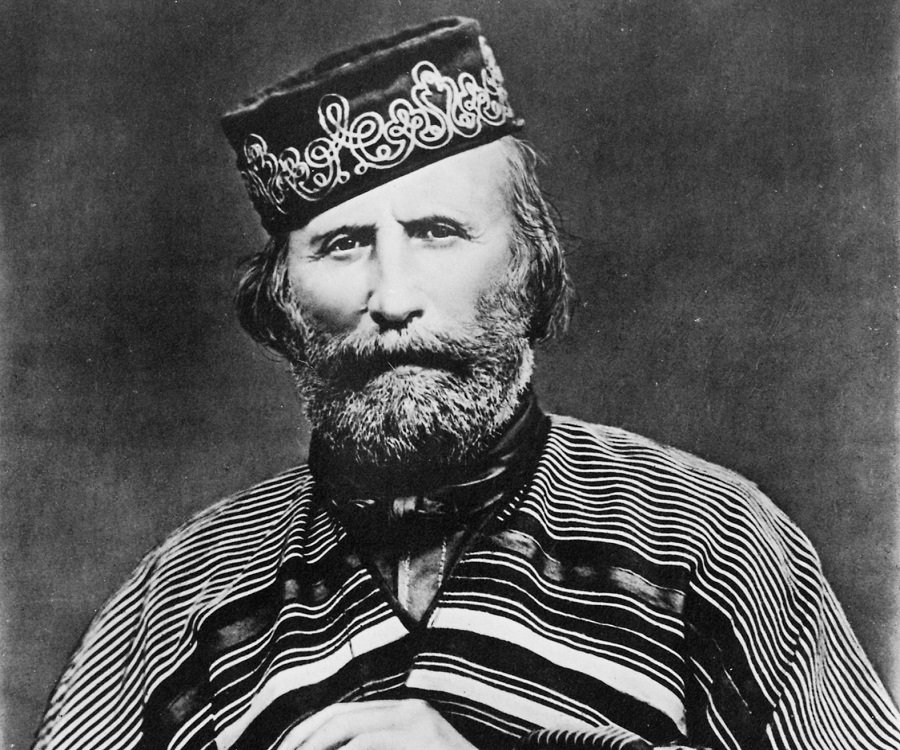He returned to Italy in 1848 and led a defense of the brand new Republic of Rome against a French force numbering 40,000 in 1849. Though he could not hold out against the more numerous French, his valiant fighting there, and then a dramatic escape from trailing Austrian forces, during which his beloved wife died, reinforced his reputation as a military commander and as a remarkable revolutionary figure throughout much of world. His well-known political beliefs did not sit well with the two Italian monarchs who then ruled much of the Italian peninsula, and he was forced to leave Italy once again, this time ending up in the United States in 1850. He lived quietly under the sponsorship of Italian inventor Antonio Meucci (who some argue is the true inventor of the telephone) in Staten Island. He spent time working in Manhattan as a candlemaker, of all things, and applied for United States citizenship. Eventually losing interest in candlemaking, he returned to the sea as a captain on several long voyages including one to Asia and Peru. In 1854 he returned to his native Italy where he bought half of a small island off the coast of northern Sardinia to farm and tend to his family.
Returning to military service in 1859 at age 51 when, provoked by Cavour, war broke out again, Garibaldi led a successful expedition against Austrian forces in northern Italy. In April 1860, there were uprisings against the Bourbon rule in Sicily, which was far removed from the war against the Austrians. This gave Garibaldi an opportunity. Not supported by Cavour, who did not want him causing troubles with their French allies about recently ceded Nizza, Garibaldi raised a regiment of volunteers, nearly all young men from northern Italy that became known as “The Thousand.” This instigated the union of the Italian peoples. His forces sailed from Genoa, landing in western Sicily in May. With aid of many Sicilians, he conquered the island by the end of July. Crossing the straits of Messina with the help of the British Navy, he traveled through Calabria and quickly entered Naples with just twenty men, arriving as a hero. He defeated the remaining forces of the Kingdom of the Two Sicilies at the end of September with the aid of the armies of the Kingdom of Sardinia, who had captured most of the papal territories in central Italy, excepting Rome. Garibaldi wanted to march on to Rome, but King Victor Emmanuel was not willing to risk war with France, whose army protected the Pope. Garibaldi decided to hand over all of his army’s gains to the Kingdom of Sardinia, sensing unity of Italy under monarchy was nearly inevitable in the near term. In 1861 he returned to his home island (on ship named Washington), refusing any reward for his services, a contemporary Cincinnatus. Though he was easily the most popular Italian figure at the time, Cavour and the king, fearful of his republicanism and mass appeal, did the best to obscure the contributions of Garibaldi and his followers.
Soon after the start of the American Civil War in 1861 this “Hero of Two Worlds” offered his services to Abraham Lincoln, who asked him to serve as a major general. Garibaldi countered that he would only serve if he was given full command of the army and that a prime objective would be that slavery would be abolished. Lincoln could not accept those terms and the offer was withdrawn, opening the door for such ineffective Union commanders as the amazingly inept George McClellan. But, affection remained on both sides, and Garibaldi always regarded the US as his second country. He used his influence to help keep the British from siding with the Confederacy, and he continued to correspond with Lincoln. One of his grandsons was even named after the President. Upon its founding in 1861 the 39th New York State Volunteers, a regiment comprised of several European nationalities took the title, “The Garibaldi Guard." His fame extended to the other side of the globe as Siberian peasants were heard talking about liberation one day by the legendary “Gariboldov."
In 1862 against the wishes of the king, who did not want to engender the potential wrath of the Catholic world and France, the anticlerical Garibaldi headed an expedition comprised of a multinational force against Rome that was thwarted by government forces in the mountains of Calabria in southernmost Italy. During this adventure, Garibaldi was actually shot and wounded by government troops, though somewhat inadvertently. In 1866, with the support of the king this time, he led an army of 40,000 volunteers into northeastern Italy, and was successful, but his efforts came to naught, as a peace was concluded before further territory was taken from the Austrians. But, Prussia rewarded their Italian allies with the Venetian lands. In 1867 Garibaldi made a second attempt to capture Rome, but the papal army, strengthened with French forces, defeated his poorly armed volunteers. His final and personally successful campaign was in 1870-71, in which he surprisingly assisted his old foes, the French, in the Franco-Prussian War after the collapse of Napoleon III’s regime in 1870 and the assumption of a republican government. He commanded the volunteer Army of the Vosges, and he was “the only general who had not been defeated” for the French. After this last military action, though a member of the Italian Parliament, Garibaldi spent most of his time on his Sardinian island, where he died in 1882.
Capitalizing on his celebrity in the 1850s, an English food company created a cookie bearing Garibaldi’s name. Featuring dark currants mashed between two light-colored rectangular biscuits, it is hardly Italian, and meant to accompany that very un-Italian beverage, tea. Even though its appearance has earned the sobriquet “fly sandwiches,” these are still on the market. Most southern Italians were not as smitten with Garibaldi in any of his manifestations as are British tea drinkers. Though his heroic and dramatic actions helped unify Italy, the benefits of unification, so closely associated with Garibaldi, did not come to fruition. Even if he was regarded as near-deity by the masses in Sicily, Calabria and Campania during his dramatic military successes of 1860, and though statues were erected, streets and piazzas renamed during the early years of the new country, the memory of Garibaldi has not been revered by the average southern Italian after unification, or their descendents. The lack of progress and many disappointments associated with the united Italy easily obscured its instigator no matter how intrepid and well-meaning he was.

 RSS Feed
RSS Feed

